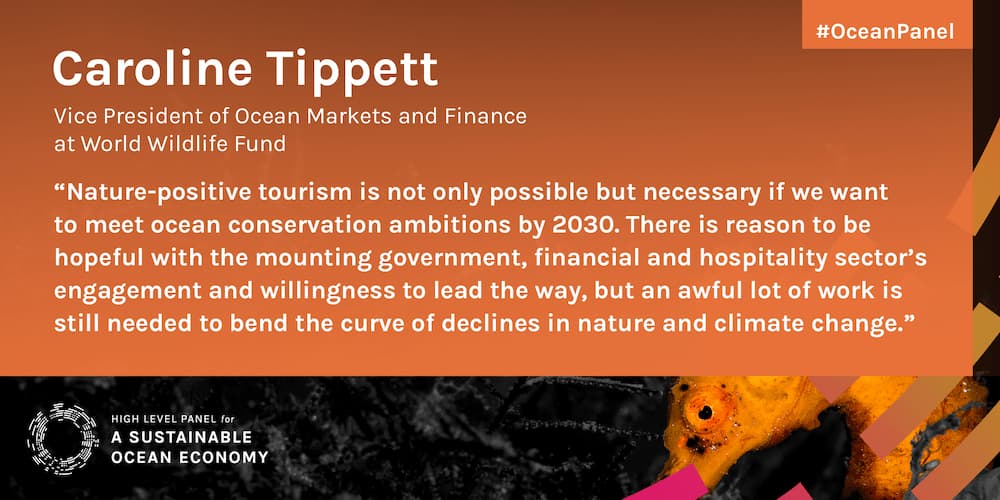Vision setting: A sustainable coastal and marine tourism sector in 2030 and 2050
What is sustainable coastal and marine tourism in 2030 and 2050? What are three key shifts needed by 2025 to achieve this ambitious vision?
Expert Perspective by Caroline Tippett, Vice President of Ocean Markets and Finance, World Wildlife Fund, published on Ocean Panel.
There is no healthy ocean without sustainable coastal and marine tourism at a scale to meet consumer demand. Well-managed tourism can support conservation while contributing to sustainable development and providing income opportunities and a higher quality of life for coastal communities. We have an opportunity by 2030 to get things right. After all, it’s in the tourism industry’s self-interest; nature is its most important business partner. Hotels, cruise ships, tour operators and the industry’s long and wide supply chain depend on beautiful destinations for their long-term business health. The vision of the World Wildlife Fund (WWF) for the next decade is to contribute with our partners in conservation towards nature-positive tourism where all supply chain actors converge to create value for people, nature and businesses. This approach has been framed by the UN Sustainable Development Goals and the industry and standards and principles set by the Global Sustainable Tourism Council (GSTC).
Leading the way hand in hand with businesses
WWF engages in our conservation work with communities, governments and companies to create lasting change. That is why WWF has been partnering with some of the world’s leading corporations in the hospitality and tourism sector for over a decade to meet conservation threats, with remarkable response.
One notable case study concerns our work with Royal Caribbean Group to certify its tour operators to the GSTC standard. At WWF’s recommendation, Royal Caribbean Group committed to increasing the sustainability of its tour offerings through the GSTC framework. The company set a target to provide 1,000 tours through operators certified by a GSTC-accredited certification body by 2020, representing about 25–30 percent of its tour portfolio. By December 2020, it had achieved over 2,000 GSTC-certified tours through 33 different tour operators in 29 different countries.
Contributing to this achievement was the thoughtful education of key Royal Caribbean staff and local tour operators on the GSTC standard and certification process and establishing a sustainable procurement policy preferring GSTC-certified tour operators. Royal Caribbean was the first major travel company to adopt preferential purchasing based on GSTC-accredited certification. This has allowed tour operators to proudly help protect the environment while also saving costs. When a shore excursion tour operator is certified, it creates an important multiplier effect, as these operators often provide tours to other cruise lines and travel companies.
WWF additionally piloted three GSTC destination assessments in Honduras and Belize with the German Agency for International Development (GIZ) and Royal Caribbean with the local governments and civil society. Similar sustainable tourism initiatives were carried out in the Philippines together with the company and Donsol. WWF is looking to expand its collaboration with Royal Caribbean in the coming years and build together a broader nature-positive initiative in Belize and other regions. This model has the potential to be replicable with other corporate partners as part of WWF’s nature-positive business strategy.
Read the full article: Vision Setting: A Sustainable Coastal and Marine Tourism Sector in 2030 and 2050 by Caroline Tippett, Vice President of Ocean Markets and Finance, World Wildlife Fund, on Ocean Panel.
The new Ocean Panel-commissioned report ‘Opportunities for Transforming Coastal and Marine Tourism: Towards Sustainability, Regeneration and Resilience’ in combination with over 40 Expert Perspectives represents an unprecedented body of information on sustainable coastal and marine tourism. It is published in response to the goal established by the Ocean Panel that by 2030 ‘Coastal and ocean-based tourism is sustainable, resilient, addresses climate change, reduces pollution, supports ecosystem regeneration and biodiversity conservation and invests in local jobs and communities’.





